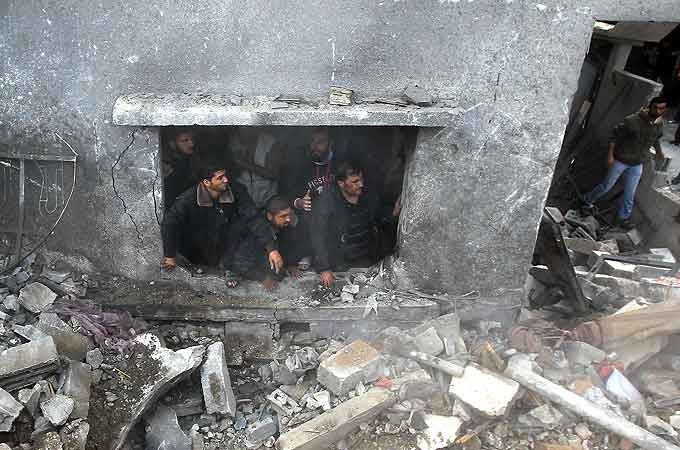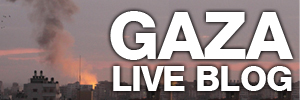EDITOR: Now there is little chance for a ceasefire, of course, as Netanyahu must prove he can kill more than Olmert!
So Netanyahu took the advice of the fascist Lieberman, and refused the ceasefire, while he could. Now the whole shebang is down the drain, with massive loss of life in Gaza certain to follow. When Israel is angry, is is the most vindictive of all countries, trying to emulate its mad and angry god, the God of Hosts, which in Hebrew, is of course the God of Armies. Growing up with a crazed and vindictive god is a difficult childhood, and it leaves its marks on the whole people, who grew up, crazed, vindictive and racist to boot, so that the other is justa Goy, and it is not just OK to kill him/her, but it is a Mitzvah for some. Many Jewish intellectuals have noticed this. A good example is Yehuda Bauer, a Zionist historian of the Holocaust:
“Am I to understand that you think Israel could commit genocide on the Palestinian people?” asked one young educator, somewhat taken aback. “Yes,” answered Bauer. “Just two days ago, extremist settlers passed out flyers to rid Arabs from this land. Ethnic cleansing results in mass killing.”
http://www.haaretz.com/print-edition/features/bauer-it-could-happen-here-1.17910
In his interview, he connects this tendency to the nature of the culture and religion they are part of. Of course, this is a matter of interpretation, say some, but the interpretation taken by most Israelis is indeed the one pointed out by Bauer. Only few days back, Israel’s Minister Eli Yishai has advised Netanyahu to “send Gaza to the Middle Ages” and a friend of his, Rabbi Yosefa, the son of the ex-Chief Rabbi, advised the government to “learn from the Syrians how to kill”! Once Rabbis are advising the government on how to kill more people, this becomes the fodder of anti-Semites. If Israel has been feeding anti-Semitism for decades, what it does now is even worse, and Jews all around the world may well pay for this crazed attitude.
How is it possible to stop this snowball? The only people who can, Obama and Clinton, will not dare to do it, as we well know. Who knows what the next days are bringing us.
EDITOR: The statement refused by the Guardian, Independent and NYTimes:
The statement below was sent to the titles above, but none has decided to print it. Judge for yourself if the statement and the people who signed it merit silencing!
A Letter on Gaza: COUNTERPUNCH
The World Cannot Stand by as Palestine is Battered to Death
by COUNTERPUNCH NEWS WIRE
We the undersigned watch with horror yet another ruthless and criminal Israeli assault on the defenceless people of the Gaza Strip. The assassination of the Hamas’ military commander, Ahmad al-Jabari, by Israel was intended to disrupt any chance for a permanent cease fire between the two sides and caused the current cycle of violence. For the last five years al-Jabari had been responsible for limiting rocket attacks on Israel.
The inaction of the Western governments is further proof of their indifference to their electorates’ wish to stop Israel from perpetrating yet another massacre against the Palestinian people.
We call upon our governments, which have stood aloof and indifferent, in the face of Palestine’s dispossession and colonization since 1948 to take immediate and effective action. No other people in the world has been subjected, for more than sixty years, to such relentless acts of collective punishment and military brutality as have the Palestinian people.
We call for the removal of the blockade on the Gaza Strip, the free movement of people and goods in and out of the region and a total cessation of lethal attack from the air, land and sea, against a helpless civilian population in one of the most densely-populated areas in the world.
The world cannot stand by when Palestine is once more battered to death.
1. Professor Judith Butler (California, US)
2. Professor Etienne Balibar (London and Paris)
3. Ms Ahdaf Sueif (London and Cairo)
4. Mr Moris Farhi MBE (London, UK)
5. Professor Ilan Pappe (Exeter, UK)
6. Professor Nur Masalha (London, UK)
7. Professor Haim Bresheeth (London, UK)
8. Professor Yehuda Shenhav (Tel Aviv, Israel)
9. Mr Tariq Ali (London, UK)
10. Professor Yosefa Loshitzky (London, UK)
11. Professor Daniel Boyarin (Berkeley, US)
12. Prof Alison Phipps (Glasgow, Scotland)
13. Professor Nahla Abdo (Ottawa, Canada)
14. Ms Josephine W. Finn (Maynooth, Ireland)
15. Professor Peter Mayo (Malta)
16. Professor Rebecca Kay (Glasgow, Scotland)
17. Professor Rachel Giora (Tel Aviv, Israel)
18. Professor Gabi Piterberg (Los Angeles, US)
19. Professor Raid Zaghal (Al-Quds/Jerusalem, Palestine)
20. Mr Michael Rosen (London, UK)
21. Professor Steven Rose (London, UK)
22. Professor Hilary Rose (London, UK)
23. Professor Oren Ben-Dor (Southampton, UK)
24. Dr Karma Nabulsi (Oxford, UK)
25. Dr Yonat Nitzan-Green (Israel)
26. Mr Ali Abunimah (Chicago, US)
27. Dr Terri Ginsberg (New York, US)
28. Dr Ghada Karmi (London, UK)
29. Professor Peter McLaren (Los Angeles, US)
30. Professor Yousef Najajreh (Al-Quds/Jerusalem, Palestine)
31. Ms Najwa Silwadi (Al-Quds/Jerusalem, Palestine)
32. Dr Ibrahim Makkawi (Birzeit, Palestine)
33. Professor Rashmi Luther (Ottawa, Canada)
34. Professor Antonia Darder (Los Angeles, US)
35. Professor Anne Ryan (Maynooth, Ireland)
36. Dr Michelle Attard Tonna (Floriana, Malta)
37. Dr. Maria Pisani (Malta)
38. Professor Nurith Peled-Elhanan (Jerusalem, Israel)
39. Keith Hammond (Glasgow, Scotland)
40. Dr. Claudia Secci (Cagliari, Italy)
41. Dr Adrian Grima (Malta)
42. Mr Tariq Ali (London, UK)
43. Dr Maud Anne Bracke (Glasgow, Scotland)
44. Dr Tom Hickey (Brighton, UK)
45. Dr Michele Marseglia (Italy)
46. Mr Michael Kenny (Maynooth, Ireland)
47. Professor Asma Imam (Al-Quds/Jerusalem, Palestine)
48. Professor Lorene Figueiredo (Rio de Janeiro, Brazil)
49. Professor Malcolm H. Levitt (Southampton, UK)
50. Dr Suleiman Sharkh (Southampton, UK)
51. Dr David Cromwell (Southampton, Uk)
52. Mr Tariq Goddard (Wiltshire, UK)
53. Professor Marcos Del Roio (Marilia, Brazil)
54. Prof. Hasan H. Aksoy (Ankara, Turkey)
55. Ms. Carmen Freitas (Rio de Janeiro, Brazil)
56. Professor Walber Meirelles (Ladeira, Brazil)
57. Dr Dorit Naaman (Kingston, Ontario, Canada)
58. Dr Annie Pfingst (London, UK)
59. Professor Socrates Stratis (Nicosia, Cyprus)
60. Professor Brian Winston (Lincoln, UK)
61. Ms Anna Sherbany (London UK)
62. Professor Moshe Machover (London, UK)
63. Dr Roger van Zwanenberg (London, UK)
64. Mr Mike Cushman (London, UK)
65. Dr. Julian Vigo (London, UK)
66. Professor Jonathan Rosenhead (London, UK)
67. Professor Daya Thussu (London, UK)
68. Dr Brian Robinson (Milton Keynes, UK)
69. Mr Abe Hayeem (London, UK)
70. Ms Rosamine Hayeem (London, UK)
71. Professor Ronit Lentin (Dublin, Ireland)
72. Ms Deborah Maccoby (London, UK)
73. Professor James Bowen (Cork, Ireland)
74. The Hon. Dr Jocelynne A. Scutt (Cambridge/Melbourne, UK and Australia)
75. Dr Brid Connolly (Maynooth, Ireland))
76. Dr Yana Bland Mintoff (Malta)
77. Dr Andre Mazawi (Vancouver, BC, Canada)
78. Professor Emilios Christodoulidis (Glasgow, Scotland)
79. Professor Daiva Stasiulis (Ottawa, Ontario, Canada)
80. Dr Claudia Prestel (Leicester, UK)
81. Professor Nadje Al-Ali (London, UK)
82. Dr Michael Murray (Maynooth, Ireland)
83. Professor Margaret Ledwith (Lancaster, UK)
84. Professor Gary Craig (Durham, UK)
85. Mr Tony Walsh (Maynooth, Ireland)
86. Dr Nicoletta Vallorani (Milan, Italy)
87. Dr Lizzie Eldridge (Malta)
88. Mr Roger Gordon (North Tyneside. UK)
89. Dr Bernie Grummell (Maynooth)
90. Dr Sue Blackwell (Birmingham, UK)
91. Dr Willem Meijs (Hoorn, The Netherlands)
92. Ms Aisha Phoenix, London (UK)
93. Ms Enid Gordon (North Tyneside, UK)
94. Professor Peter Gose (Ottawa, Canada)
95. Ms Pragna Patel (London, UK)
96. Professor Derek Boothman (Bologna (Italy)
97. Mr Eyal Sivan (Paris, France)
98. Dr Adania Shibli (Palestine)
99. Professor Eyal Weizman (London, UK)
100. Dr Fatieh Saudi (London, UK)
101. Professor Jeffrey Skoller (Berkley, US)
102. Professor Stephen Deutsch (Bournemouth, UK)
103. Mr Firas Asidy (London, UK)
104. Professor Ali Nobil Ahmad (Lahore, Pakistan)
105. Professor Corinne Squire (London, UK)
106. Ms Zahraa Tatari London, UK)
107. Professor Annabelle Sreberny (London, UK)
108. Dr Marta Rabikowska (London, UK)
109. Professor Nira Yuval-Davis (London, UK)
110. Ms Ruth Tenne (London, UK)
111. Dr Azzam Tamimi (London, UK)
112. Ms Naomi Wimborne-Idrissi (London, UK)
113. Mr Keith Piper (London, UK)
114. Professor Maurizio S. Viano (Boston, US)
115. Professor Anne Phoenix (London, UK)
116. Professor Michael Chanan (London, UK)
117. Dr Agnieszka Piotrowska (London, UK)
118. Professor Chris Berry (London, UK)
119. Mr Bisan Abu Eisheh (London, UK)
120. Professor Abby Lippman (Montreal Quebec, Canada)
121. Mr Sid Shniad (Canada)
122. Dr Stephanie Cronin (Oxford, UK)
123. Mr Richard Kuper (London, UK)
124. Professor Flavia Laviosa (Wellesley, US)
125. Ms Mira Khazzam (Montreal, Canada)
126. Dr May Jayyusi (Ramallah, Palestine)
127. Professor Sarah Bracke (Leuven, Belgium)
128. Dr Nadia Fadil (Leuven, Belgium)
129. Dr Seda Gurses (Leuven, Belgium)
130. Professor Laura Mulvey (London UK)
131. Mr Ronnie Barkan (Tel-Aviv, Israel)
132. Mr Bob Reckman (Northampton, MA US)
133. Professor Hagit Borer (London, UK)
134. Professor Joan Braderman (Northampton, MA, US)
135. Professor Laura Marks (Vancouver, Canada)
136. Professor Sean Cubitt (London, UK)
137. Professor Dina Iordanova (St. Andrews, Scotland)
Israel’s scorched earth policy in Gaza could prove fatal: Al Jazeera English
|
The US and other western governments have failed to publicly criticise Israel for its iron-fist policy on Palestine.
Last Modified: 20 Nov 2012
|
||

The death toll in Gaza within the past week has already reached over one hundred [AFP]
|
||
The recent Israeli pounding on Gaza reminds us of the brutal Gaza invasion in 2009 that resulted “in between 1,166 and 1,417 Palestinian and 13 Israeli deaths (four from friendly fire)”. The human toll and the destruction of the infrastructure in Gaza nearly five years ago still reverberates. The current bombing spate by the Netanyahu government from the air and sea is again turning Gaza into rubble.This, according to the Israeli government, is in response to hundreds of rockets fired at Israel by Hamas from Gaza, that has created fear amongst the Israeli population and claimed three Israeli lives. But this is asymmetric warfare: The death toll in Gaza has already crossed 100, including many women and children.Israel says it is only targeting selective targets with “surgical precision”. But its claims are not substantiated by facts: The majority of victims are innocent civilians. Despite some pressures from America and Britain, Israel is massing its troops near Gaza; a ground invasion seems possible.The Gazan people’s back has been to the wall for some time; they have been subjected to inhumane conditions under almost total siege by Israel for some years – something considered illegal under international humanitarian law.According to a UN report, Gaza in 2020: A liveable place?, “Israel’s Operation ‘Cast Lead’ in 2008-09 ’caused a total of US$181 million in direct and US$88 million in longer-term costs for Gaza’s agriculture; generated about 600,000 tonnes of rubble and US$ 44 million in environmental costs.”
The trauma it created is irreparable and the conditions are dismal. As late as 2010, British Prime Minister David Cameron termed Gaza as a prison camp and the former US President, Jimmy Carter, called Gaza a prison. Atmosphere of despair Beyond Gaza, the situation in historic Palestine is not much different. Israeli land grabbing, illegal settlements and ethnic cleansing in occupied territories, forced removal of families from their homes, the increasing refugee problems, massive unemployment, daily humiliation of Palestinian people in the crossings, the erection of the “apartheid wall” – have all created an atmosphere of despair. As in its 2009 operation, Israel is trying to match its overwhelming military might with its superior media outreach in the western world. As a result, and due to what seems to be America’s depressingly unquestioned support for Israel, many in the West buy in to the Israeli narrative claiming Hamas as a “terrorist” organisation. Sadly, people have a short memory. They forget that Hamas, for all its flaws, formed the legitimate Palestinian government after winning an internationally-accepted election in 2006 (but they were conveniently dumped by the US and other western governments). The fear of being accused as anti-Semitic has inhibited many in the West from publicly criticising Israel’s historic injustice to the Palestinians. Some try to be ambivalent; in order to prove their neutrality, the only thing they do is offer some advice to Israeli and Palestinian politicians to sort out the mess on the negation table. However, an overwhelming majority of people in the Muslim world and many in Asia, Africa and Latin America consider Israel a Pariah state, supported by the world’s sole superpower, the United States. Many consider Israel as a Goliath when it comes to the Palestinian people. The US and other western governments have failed to publicly criticise Israel for its iron-fist policy on Palestine. That has made them incapable of becoming honest peace-brokers between the two sides. The so called “road map for peace“, initiated by the US in 2002, was rejected by Israel and did not see the light of the day. The recent call from some western leaders for a “de-escalation” of the crisis by asking Hamas to stop firing the rockets and pleading with Israel not to wreck “international support” only shows impotence. There is a clear lack of leadership from western leaders, particularly the US administration. Military might Israel has massive political and military might and the Israeli leadership is also known to be politically smarter than the Arab leaders. Israel has become a garrison state with conventional and weapons of mass destruction that include nuclear bombs (although not publicly acknowledged). It has the unconditional backing of the largest military power on earth. This has blinded Israel’s judgment and made it arrogant. But in the greater scheme of things, the Israeli leadership lacks strategic wisdom that is needed for its future. With all its military, diplomatic and media advantage, time is not on Israel’s side. History also teaches us that the days of injustice do not last long. The Palestinian people may be underdogs now, but people with insight can see they are the ones who are setting the future agenda. Whatever Hamas is doing – out of madness, desperation or a long-term strategy – Israel seems to be falling in their trap of an un-winnable, long and protracted war. The Israeli strength so far has lain with the disunity and incompetence of the Arab regimes. But things are changing within the Arab world, as we all know. Plus the tectonic plate of world economic power is shifting towards the East; with it the global political and military power may change at some time in the future. During the 2009 Gaza crisis, two prominent Muslim countries – Turkey and Egypt – carried little weight in the world. Now they are trying to assert their rightful place. Their position on the Arab-Israeli conflict is now clearer. For the first time in many decades, the world attention has focused on Egypt. Whether its President Morsi succeeds in bringing the two sides to a ceasefire agreement will be interesting to see, but a new chapter seems to be dawning in the Middle East. A just and lasting solution to the Arab-Israeli conflict is not only essential for Israeli and Palestinian people, but also for the whole world. This needs a clear “thinking outside the box” by the Israeli leadership and their backers in America. And it must come soon. Dr Muhammad Abdul Bari is the former Secretary General of the Muslim Council of Britain (2006-10). He is an educationalist, community activist and parenting consultant. He is a founding member of The East London Communities Organisation (TELCO) and currently Chairman of the East London Mosque Trust. Follow him on Twitter: @MAbdulBari |
Companies supporting Apartheid Israeli and its occupation:
Stop pretending Israel’s massacre in Gaza is part of an even battle with Hamas and the Palestinians: Independent
On one side you’ve got three generations of a family wiped out. On the other, a woman’s got to ring Autoglass. And we act like this is battle whose fate is in the balance
Tuesday 20 November 2012

To start with, why do the news channels ask Tony Blair for his advice on conflict in the Middle East? It’s like asking Gary Glitter for advice on what to do about Jimmy Savile.
But somehow it fits with the rest of the coverage. A report yesterday morning began with the sentence: “Rockets have continued to be fired from both sides…” Then, to illustrate this, we saw a demolished building in Gaza in which 11 people had perished, and a woman in Israel standing next to her car with a smashed windscreen. Which goes to show everyone’s suffering, what with three generations of a family getting wiped out on one side, and a woman having to ring Autoglass on the other. Honestly, they’re all as bad as each other.
By tomorrow, a spokesman for Israel will be on the news channels saying: “No other country would put up with this. We have citizens worried about losing no claims bonuses. If we don’t flatten their cities, what will we have to put up with next? Broken wing mirrors? Dents in passenger doors? Have you tried getting body repairs in Tel Aviv at short notice? So we have no choice but to destroy a hospital.”
Then we’ll see the funeral for the Palestinians, followed by the car owner wailing “O my beautiful laminated darling” as her windscreen gets tipped into a bin.
The reason so many get killed, says Benjamin Netanyahu, is that Hamas “hides behind civilians”. Because it’s the duty of anyone who gets assassinated to make sure they’re in a clear, open space at all times so the cruise missile aimed at them doesn’t bump into anyone else. That’s basic health and safety, that is.
But Hamas have become even more cunning in this conflict, because the commander the Israelis were aiming at in the building in which those 11 civilians were killed wasn’t there at all. At least if he’d bothered to be where the Israelis thought he was, the civilians would have died for a reason. Now, because he had the cheek to NOT hide behind civilians, they’ve been killed for nothing. There’s no end to their devilish methods is there?
But some Israelis are working for a solution. For example ex-Prime Minister Ariel Sharon’s son, Gilad, wrote in The Jerusalem Post: “To accomplish victory, you need to achieve what the other side can’t bear. The Americans didn’t stop with Hiroshima – the Japanese weren’t surrendering fast enough, so they hit Nagasaki, too. There should be no electricity in Gaza, no gasoline or moving vehicles, nothing.”
Even if they did drop a nuclear bomb, Netanyahu would say: “The reason so many were killed is Hamas hid Gaza behind its civilians. If they’d moved Gaza to somewhere safe like Greenland, the population would hardly notice a thing, but, as usual, Hamas cared only about propaganda.”
Then The Jerusalem Post would report “We’ve done Gaza a huge favour. Now none of their vehicles can move, so they’re spared the misery of trying to repair a broken windscreen.”




